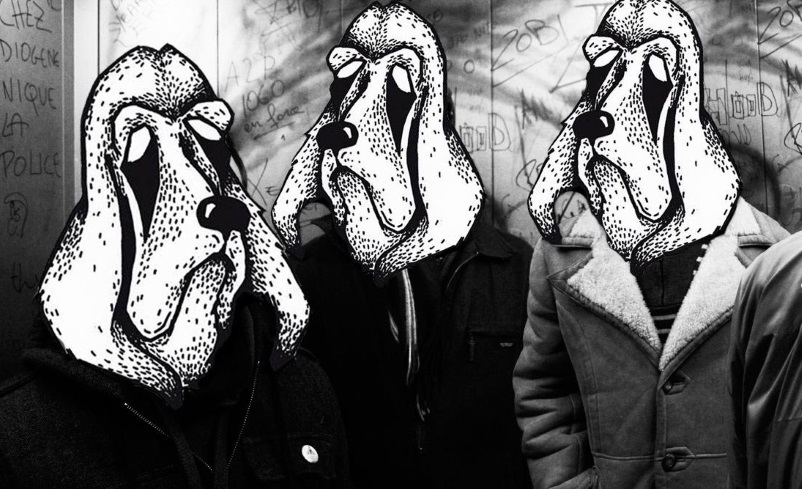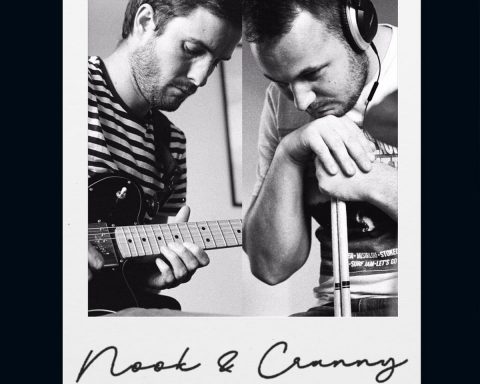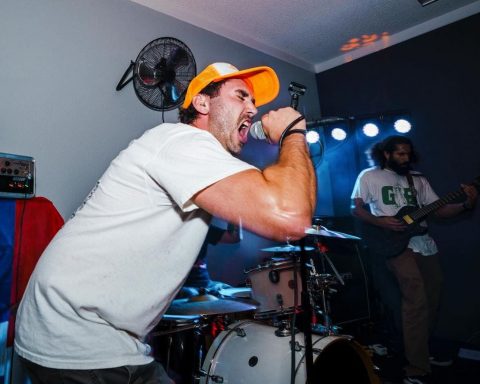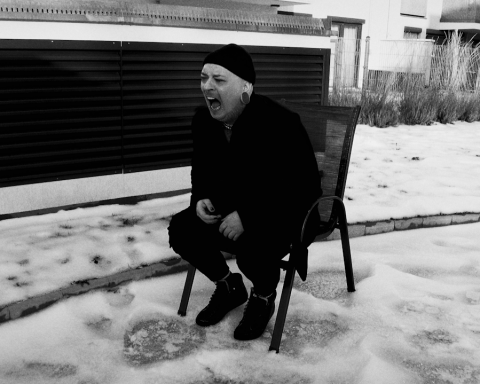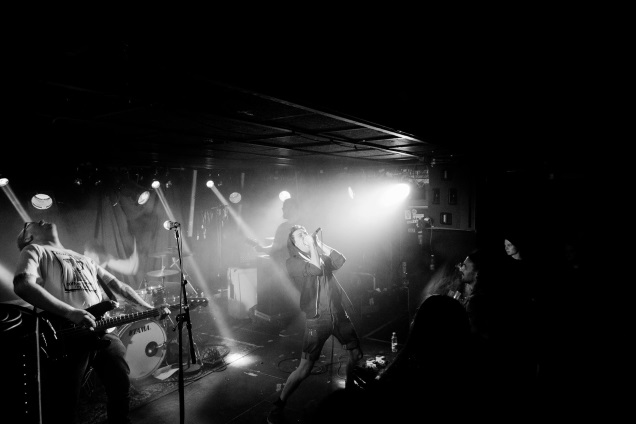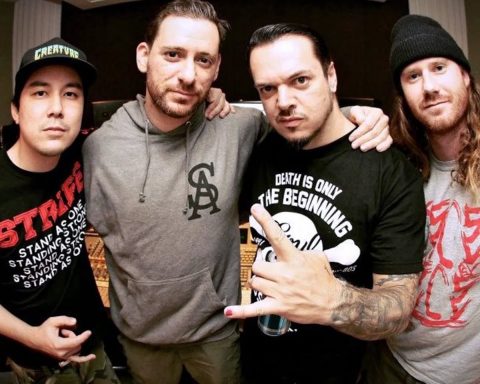Black Basset Records is a Brussels-based DIY label born in 2013 out of the desire to put a spotlight on artists and aesthetics with little or no media attention. The label’s roster is eclectic, explosive and not limited to any genres, happily moving from electro-rock to screamo-hardcore. Read the rest of the official introductory word the lovely, insightful interview with the label’s owner Didier below.
The Black Basset is, so far, home to BILLIONS OF COMRADES, MONT-DORÉ, AUGURES, CASTLES, THOT, SEILMAN BELLINSKY, and QUADRUPÈDE.
Black Basset Records is a DIY label, launched in Brussels in June 2013. It’s a labour of love, run by two music fans with a background in gig promotion. DIY is our credo. We were sometimes sick and tired of seeing quality bands and artists unable to release their own music decently, due to lack of funds or energy. So we decided to jump in and help them. Black Basset Records was born. Its ultimate motive: to release quality music on nice vinyl records. These records are also available digitally, but we have no plans to release CDs. None at all, don’t ask.
The first releases of the label are local bands we’ve met early on in their “career”. We saw them grow, we saw them live plenty of times, and we spent way too much time in bars with them. This led to the records that are now available. This also confirmed our decision to work mainly with bands that are local or at least connected to us in one way or another. Because all this malarkey is about mutual respect, don’t you know it?
At Black Basset Records, we want our releases to be just like us: not limited to one specific music genre. Because we listen to quite a lot of things, from hip-hop to black metal and from Chicago noise to folk music. So expect the unexpected and releases coming from all directions.
The label will celebrate its first anniversary with a trio of amazing shows in Brussels. See the details below.
31st October 2014 @ Beursschouwburg: CASTLES + MONT-DORE + special guest ELECTRIC)NOISE(MACHINE
29th November 2014 @ Atelier 210: THOT + BILLIONS OF COMRADES + QUADRUPEDE (album release party!)
12th December 2014 @ LR6: The Black Basset Exhibition featuring Jean-Biche, BRUUT, Haiku Design, Serguei Spoutnik, Stress Stranger, John Gallardo photography, Jérôme Considérant and more + showcases by RINCE-DOIGT and ALTO CARGO
Hi Didier! Thanks so much for taking some time with IDIOTEQ. Some readers may not be familiar with your work, so please give us a short description of BB Records and how it interacts with its followers.
Well, there’s no shame in not being familiar with us, as we are pretty much new kids on the block! Black Basset Records was launched as a vinyl and digital-only label one year ago. Although we have been active for years in the promotion of concerts in our hometown of Brussels, Belgium, the decision to go one step up and release records for the bands we love only happened in 2013. The label has released seven records in its first year of existence (MONT-DORÉ, BILLIONS OF COMRADES, CASTLES, SEILMAN BELLINSKY, AUGURES, THOT and AUGURES again). We want our “roster” to reflect the variety of music we enjoy and decided from the beginning that we would not put any genre-limit on our releases. That’s the very same approach we use for the gigs we promote: if we like a band, if we think an artist has something to say and a personal approach to music and if that music is having a random effect on us, then it might be a goer! That’s how we ended organising hip-hop, noise or metal shows and that’s why our releases do range from screamo hardcore (MONT-DORÉ) to cinematographic noise/doom (SEILMAN BELLINSKY) to a more electro/industrial approach (THOT). It might look all over the place at first sight, but it does make sense. Although we had to start all our communication from scratch (that’s, after all, the joy of a new venture), we were able to rely a lot on all these contacts we developed through years of gig promotion. That’s how the bands on Black Basset Records manage to play in more than 15 countries in Europe and most of our records were actually mainly sold outside of our home country. I guess that’s not bad if you take into account that most of the albums we released were first ones for most bands. From there on, you keep meeting more people and the ball game keeps getting bigger!
So was that the hardline intent of the label to find original cases where heavy music came into contact with more experimental works? Was it the main idea, or a concept behind the forming of Black Basset?
It’s not even as complicated as that, there is simply no more detailed intent than helping people to release what we consider to be quality music.
The “big plan” is simply to release music we like, and we think deserves to be spread to a larger audience. It just happens to be with bands we are familiar with, either because they are local to us or because we got to know them through the shows we put up in Brussels. Our approach to music is pretty much intuitive: it is either having an impact on us, is touching us, or it is sometimes going straight over our heads. The genre of music itself does not really matter that much, although it is quite clear our personal backgrounds are more linked to darker and heavier music. Let’s say that, instead of being what is often called a niche label, ie a label specialising in one particular genre of music, we are (a bit unwillingly) developping a kind of spectrum. The only thing is that we did not bother defining what the spectrum should look like. But I guess you could listen to all Black Basset Records bands in a specific order and see some kind of gradual progression, some kind of structure being put in place that’s not perceptible at first sight.
Besides running the label, what are some of the main elements and foundations of your intimate involvement as part of the DIY music ecosystem? What activities other than running this label are you involved in?
It’s going pretty much in all directions, and I think that the two of us have been involved in quite a lot of different aspects of DIY. We book shows, we help as much as we can with booking and promotion of our bands, we accommodate bands on the road at ours, we try to develop collaborations with other collectives as much as we can, helping them when requested to do so. If you add that, in the past, Clo was involved in the running of a concert venue and the organization of a DIY festival and I used to write for a few webzines, I guess we have touched quite a lot of different aspects of DIY. I guess that, if the Belgian hardcore scene from the 90s taught me two things, it is probably developing a strong interest in animal rights and most importantly the idea that if you really wish something, you better make it happen yourself!
It is actually quite impressive to realise how fast an idea can get a lot of people in motion. To celebrate the label’s anniversary, we will be hosting three different “nights” in Brussels later this year. One of these will be a kind of exhibition to put a spotlight on all these people who are or were actually involved in the seven releases we have put out so far: graphic design, VJ-ing, video clips, booking, photography, that type of things. A first headcount shows that no less than 83 people were involved at some point, which is quite impressive if you consider that we do not operate as a business and that all this is relying much more on good will and personal involvement than money.
How would you personally define the label’s role in the promotional and creative processes of the artist you support? Do you think musicians still need labels? Why?
At our level, which is strictly DIY and with no business or financial plan to properly talk of, I would say our approach is 360° as the big businesses love to call it: we might be involved into recording, publishing, distribution, digital, merchandising, booking, you name it. Not necessarily out of choice, but simply as a way to support the bands whose records we are putting out. I am still convinced you can be quite professional even without money as long as you do what you do with passion and a bit of creativity. It is easy nowadays to release your music without a label, but let’s be honest, it is also a lot of work and if you are in a band, you may simply prefer to focus on your music, your concerts, your lyrics, … and leave the rest to people who are willing to help. Booking, graphic design, contacts with press, webzines and anyone who might care about your music are a kind of never ending game which takes time, a lot of time. So, I guess, if you can get some help, why not take it?
So what’s the deal for you then? What do you get for helping them?
Well, I guess it’s some kind of adventure package! You become part of your very own decision process, you decide to make things happen simply because you put value into them. And it is slowly becoming an important part of your life, if only because of the time you spend on it. At the end of the day, along the same reasons for which we were putting up shows, it’s more a case of making something happen that may not have happened without you, or at least not under the guise it is now happening.
What does DIY mean to you? In today’s flood of mainstream entertainment, do you see some values being sucked out of young people’s culture as a result?
I realise it may sound cliché but DIY, in my opinion, means becoming an actor of your own life, to realise that you can make some things happen that you may not have thought could happen in the first place, only through patience, curiosity, friendship and similar “basic” straightforward values. I guess you could go as far as saying it is some kind of personal resistance, in the sense that you do not take anything for granted or accept things that are forced on you. You try to make your point count.
And that’s where it is in total opposition with the current mainstream entertainment industry, which is in fact about people applying their very own marketing plans to large demographics that do not even realise how they are targeted. If you take music, we are at a point where a lot of the “hit artists” cannot sing or play any instrument, did not write any music nor any lyrics, yet are topping the charts. It’s a world in which a powerful company such as Apple can inflict a U2 album on 500 million people without asking them if they have any interest in it in the first place. Where’s the free will in this? How come so many people come to accept such a situation without questioning it? I guess self-education is the key word I am looking for here!
Ok, so how did you approach the artists you’ve signed? Do they come to you?
We started in what we saw a logical and organic way, ie with bands that were close to us: we already knew BILLIONS OF COMRADES as we had invited them as support act for a couple of shows we had put up, and MONT-DORÉ is a project we followed from scratch. I saw their very first gigs and realised quite quickly I had to work with them one way or another. So it made sense in our eyes to have these bands first albums as our very first releases.
The other projects came along in the same way, it was either bands we had already put up shows for or that we already knew through various music channels. And to be honest, after seven releases, that’s probably how we would like to keep it: first make sure that we get along well with the people, that we like their music and their approach and that there’s actually a chance we can collaborate in an effective way. This has obviously not stopped people from coming to us (and they are welcome to, in case of doubt) but we have turned everyone down so far, if only because of the way we work, which requires a bit of proximity. In fact, the first exception to that rule will only appear later this year. All rules are made to be broken after all.
Are you planning some new signings as we speak? Can you tell us what records you have coming up?
So, yes, our next release is what you could call a new signing and, in fact, also the very first act that we discovered online, loved at first sight, got in touch with and got along well. It is a math-rock/post-rock/electronica/you name it duo from Le Mans, in France, called QUADRUPÈDE, and we will release their first album in December. There are already plans for them to play in France, Belgium, Holland, Denmark and Germany later this year, so people probably have not heard the end of this story. I guess you could say they will be on the “lighter” end of our music spectrum I was telling you about earlier on.
We also have plans for a new MONT-DORÉ record, which should be more accessible than the first EP, at least from a studio sound perspective, and we are talking to another Belgian band which should bring us back into heavier and more hardcore waters this time. It’s an entertaining rollercoaster really!
Great to hear that!
Belgium is well known for many amazing bands that are into underground subgenres of all kids. Where do you place the current state of your local punk and alternative music scene?
I guess we have quite a lot of quality acts for such a small territory. Now, living it from the inside, it is sometimes quite difficult to judge the whole thing objectively. The second half of the 90s was so rich with the H8000 and zillions of quality bands that you had gigs everywhere, all the time, and hardly anyone by then actually realised how easy these times were. Nowadays, I would say it is more split all over the place. Every major city will have its collective and local people working towards putting up quality DIY shows and supporting their local acts. Things are happening but are getting more difficult to organise, if only because less and less places are open to accommodate all these events. If you take the example of Brussels, the closure of RTT and Compilotèque has simply barred some more experimental artists from playing in the city, while the Magasin 4, THE alternative venue in town might be celebrating 20 years of existence but is still under the threat of being closed in the coming years. All in, the quality is there, and exciting acts from all genres keep appearing here and there, but gone are the days where you could simply contact your local youth centre and host a hardcore Sunday matinee that would attract hundreds of people. I have lost count of the shows I attended with less than 50 people around. Venues willing to accommodate bands that are, shall we say, out of the ordinary, are the key for the future.
And here are a few tips about young and upcoming Belgian sounds that might be to the liking of the Idioteq readers: ATLAS, EVERY STRANGER LOOKS LIKE YOU, ELECTRIC)NOISE(MACHINE (featuring ex-membres of ARKANGEL and DEATH BEFORE DISCO), COCAINE PISS, DAGGERS (released by our friend Matthias at Throatruiner Recs) and BRUTUS, to name only but a few!
Great, thanks!
Ok, so back to the label business, where do you press and master the records? How complicated is this process?
It happens literally all over the place. In terms of pressing plants, we have worked with people in Germany, the Czech Republic, France and the UK. As you probably know, the amount of vinyl record pressing plants in Europe is very limited, so not only do you need a “gotta catch’em all” pokemon style approach, you also need to be very patient. Pressing vinyl is a strange business: the demand for vinyl records keep increasing but the amount of presses remains unchanged, simply because no one is building any of these anymore. With most of the plants favouring the large orders – which of course are coming from the bigger record labels – for obvious financial reasons, tiny operations like ours tend to be moved down the pecking order and might lose time in the process. But all in, it’s a pretty straightforward operation. As far as mastering is concerned, it is the same guy, Frédéric Alstadt (who also runs the micro label Angstrom Records) that mastered the albums of THOT, MONT-DORÉ and BILLIONS OF COMRADES in Brussels, while the CASTLES album was mastered in Seattle, thanks to the contacts of Kurt Ballou (CONVERGE) who recorded the album. The upcoming QUADRUPÈDE album was mastered in London, so, all in, mastering, just like pressing, is processed all over the place!
It looks that with the web, hundreds of amazing online tools, and all the other devices, it’s way easier to get your voice heard. How do you distribute your music?
It is indeed quite easy to make your music available all over the world, at least digitally. We tend to use most streaming platforms, from Bandcamp to Spotify and some of our music (MONT-DORÉ, AUGURES) can be downloaded for free too. Physical distribution is proving to be much more complicated. Not because it is difficult to get a “pro” distribution deal but because we only work with very limited quantities of records. Our biggest pressing so far is Seilman Bellinsky, with 500 copies. Do we want to give a large part of the stock to a “pro” distributor which will make sure it is available in as many record shops as possible, while we know people prefer to buy records directly at shows? Not really! It is a lot of hassle, it means records are, most of the time, not where you need them to be, and more importantly, it would make them more expensive for fans to buy them. That’s one of the reasons while we rely a lot on DIY distros, such as Throatruiner, Disobedience, Eastrain, SM-Musik or on “fair trade” distributors such as CD1D, they seem much more adapted to our needs and we know at least that the tiny money they take will be re-injected in the very same circuit we are active in, it really is a win/win situation.
On top of that, we also rely on webzines like yours to share the love, and we try to favour other more “out of the ordinary” initiatives, like participating in free compilations, organising shows in places that are not meant to host concerts in the first place, playing for charities or, more recently, our project to organise shows in prison.
Do physical stores now have specific relationships with small record labels like BB? Is it even worth your time to try to push your record in the good old way?
I would say so, yes, most small independent record stores have welcomed us with open arms. We never approached the big chains anyway! But I can only think of one record store who turned us down really. So there’s definitely a will from small indie shops to see a certain type of non-mainstream music thrive.
That’s a good question about distribution though. To be honest, I am still undecided! Getting a professional distributor is not that difficult, but as I explained earlier, do you really want to lose time, money and energy on a system that is best adapted to big-selling artists, while most of your records only exists in very limited quantities and are mainly sold at gigs anyway? It’s a tricky one, getting “proper” distribution gives you coverage and makes you accessible to everyone, but I feel like there’s a middle option missing here, something in between the DIY and the full scale distribution. The ideal solution for tiny labels like us would probably be to be able to deal with records shops all over Europe directly, but that won’t happen, of course. What makes it even more difficult is that not all our bands target the very same audience, and they tend to meet relative success in different territories. A band like CASTLES created a lot of interest in the UK, while most THOT records will be sold in Central Europe. In itself, it is really cool and it really shows a diversity we did not even expect, but go figure a solid distribution plan to cover all these needs at the same time….
Promotion-wise, what’s the reach out process like being that you don’t have many artists signed?
It’s the very definition of “starting from scratch”! Which, I would imagine is the case for any small label, you have to start somewhere and that somewhere is often the “but who are you?” level. But, globally, promotion is a simple yet interesting process, although you sometimes feel very narcissistic when spending your time getting people interested in what YOU do. You start developing your own network, sometimes in countries you have never visited. You realise that some people, thanks to the internet, will start to take notice of what you do, start talking about it, and that’s the best part I guess. It’s all about getting the ball rolling, it never happens quickly enough in your opinion, and the ball will never roll fast enough. I guess that’s the strange part with music in general, it’s that you can always hope for more, it’s never a finished business.
After one year in existence, we are quite happy with the way things are shaping, all the BBR bands are touring regularly, we get a lot of interest from venues and from the press, to the point where we will organise three “anniversary” nights in Brussels in venues we could only have dreamed of when we were putting up shows ourselves, so that’s great….even if not enough! More seriously, even if it could (always) be more, you have to accept all this is a long-haul process. After all, we did not start with any defined expectations. And if you had asked me about it 12 months ago, I would probably have happily signed to be where we are now.
How do services like YouTube deal with DIY labels like yourself? Does it help or hurt your position? Do you earn some money with online campaigns?
YouTube is offering the most basic monetization service available to small structures like ours. Bearing in mind that we need the exposure, if only because we are coming out of nowhere, you take it without any discussion and see it as a reversed investment, ie money you don’t earn but that might help to develop a band. The same rules apply to streaming platforms. A band like CASTLES, with something like 65,000 track streams will only get a couple hundred euros or something along those lines. Nothing to write home about but, once again, when you start from scratch, you need the online presence. You may be as big as you want locally, it is the only way to get yourself heard in other territories and overseas. I think a lot of people are coming to grips with this, and realise that if they really want to support an artist, it is probably better to buy a nice limited vinyl edition of their record more than anything else. Let’s be honest, at our level, this is a not-for-profit operation, we are happy to break even and all monies earned are re-invested in touring, shooting video clips, etc. That’s the spirit after all, go out there and get your music heard and enjoyed!
Sure thing! Ok, so what is one of the hardest things about the underground music “industry”? What’s the biggest challenge in running a label like BB?
It’s probably learning to juggle with zillions of different tasks at the same time. From graphic design to accounting, from basic understanding of author’s rights to booking, from distribution to promotion, the amount of tasks is unlimited and you better learn your trade quickly. We have quickly realised we made a few key mistakes when we started, some even look so basic now that we have no idea how we did not consider them that way at the time. So better be a quick learner. Bearing in mind the label is absolutely not our day job, time-management is the key, you quickly understand that you may have to miss on some sleep hours to finish stuff on time. But I surely would not complain about it, it is a very exciting hobby and you get the best kind of “salary” when the unexpected happens. For us, it might have been BILLIONS OF COMRADES on national TV, MONT-DORÉ at Fluff fest, that mad show from THOT in a tiny Slovenian venue or having to rush a re-press of the CASTLES album only two months after the initial release. I’ve said it already, but it really is a rollercoaster. No money but lots of fun to be had.
Alright, Didier. Thanks so much. Before we say goodbye, please recommend some new bands to our readers which you feel deserve their attention.
There are so many upcoming cool projects to name! Exciting times indeed. To only name a few: German duo Mantar, which have released an incredible album on Svart Records, Deathcrush from Norway, who have been around for a while but are touring irregulary, if you don’t know them, check them out as soon as possible.
Also, WEAK WRISTS, from North Carolina, which have released this pretty cool demo recently, SLEEP BEGGAR, the strange-ish yet uber-cool project started by BASTIONS frontman, whose record I wish my postman would deliver at last, and Brutus, a new project from Belgium, which has that “je ne sais quoi” that seems to tick all the right boxes!
Any ending thoughts? Thanks so much for your time!
Well, thank YOU for taking the time to talk to us, it is much appreciated. As I have said, this kind of interview is a nice way to put a bit of spotlight not only on the label but on the bands whose records we put out. So, enough about BBR, why not go and check these guys out?



